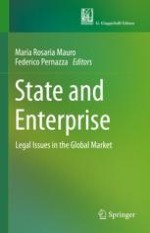2023 | OriginalPaper | Buchkapitel
The Relationship Between a Host State and a Foreign Corporate Investor: A Few Remarks Under International and the EU Law
verfasst von : Pia Acconci
Erschienen in: State and Enterprise
Aktivieren Sie unsere intelligente Suche, um passende Fachinhalte oder Patente zu finden.
Wählen Sie Textabschnitte aus um mit Künstlicher Intelligenz passenden Patente zu finden. powered by
Markieren Sie Textabschnitte, um KI-gestützt weitere passende Inhalte zu finden. powered by
